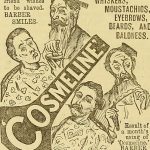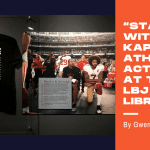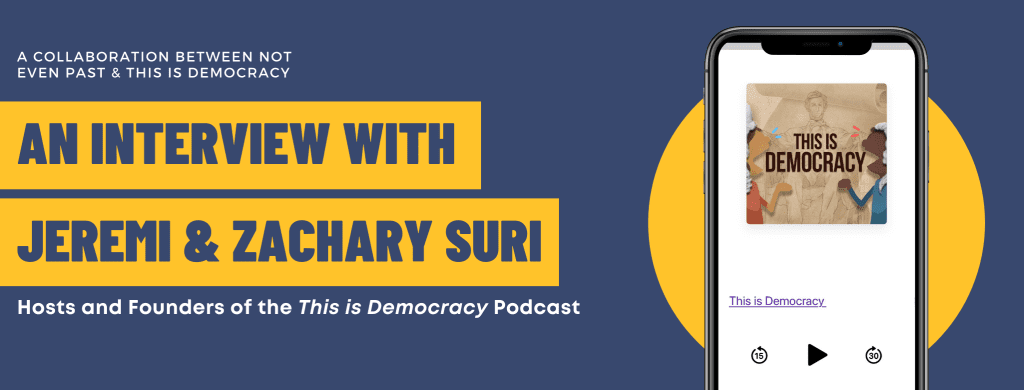
This semester, Not Even Past announced a collaboration with This is Democracy, a podcast hosted and developed by Dr. Jeremi Suri and his son Zachary. Jeremi Suri holds the Mack Brown Distinguished Chair for Leadership in Global Affairs at the University of Texas at Austin. He is a professor in the University’s Department of History and the Lyndon B. Johnson School of Public Affairs. NEP Associate Editor, Alina I. Scott sat down with the Suris to discuss the origins of This is Democracy, their reasons for selecting guests, and much more. Listen to the interview or read the transcriptions below.
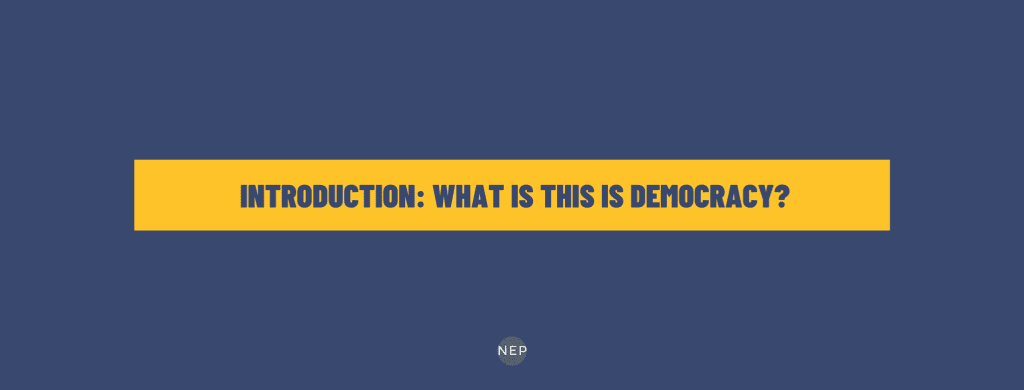
AIS: So to start out our conversation. This is a really interesting time to be in the United States to be talking about democracy. And this podcast is incredibly timely. So I want to start out with just a basic introduction. What is This is Democracy? And how would you introduce this to someone who’s not necessarily familiar with the podcast?
JS: Thanks for the question, Alina. This is Democracy is a unique podcast. Our podcast is aimed at a wide range of listeners, in particular, younger listeners, as well as scholars and policymakers and experienced citizens. And our goal with This as democracy is to have conversations with people who are doing important work in our society today, drawing on the past to build a better future. So every episode is historically informed. Every episode is about actions, challenges opportunities today, and using historical knowledge and experience to build a better future. It’s very much about what Franklin Roosevelt who inspires this podcast, what he called the new chapters of democracy that are built based on knowledge of the old chapters, and addressing the concerns of our current moment. And I’m going to let Zachary say a little more, because he’s been instrumental in thinking about the substance and also the audience for this podcast.
Zachary Suri: Yes, so one of the things we try and do is we try and bring guests from across many different parts of society and academia. In particular, we try and highlight scholars at UT, and across the country who are doing important research that maybe doesn’t get the attention that it deserves. But every episode, we try and make it directly relevant for young people. And we always conclude our podcast with the question, how should young people get involved in this? So that’s really one of the central themes of our podcast.
JS: And one other point I just want to make and I’m sure we’ll talk about this more one of the defining features of our podcast, Alina, is that we really embrace the arts. We believe that history and social change and democracy. These are arts, which is to say, they are constantly being remade in creative ways by new kinds of people with different backgrounds and different experiences. There’s no formula. And for that reason, we open every podcast with an original poem, we’ve now had 121 episodes, and 121 poems by by Zachary and the idea of the poem is to set the theme for the topic we’re talking about that week, but also to open us all up for discussions outside of our normal comfort zones outside of our routines to really address issues as artists, not as ideologues. Not even as traditional academics. But as people trying to make sense of a complex world. Zachary, do you want to say a little more about your poetry writing, which really is the defining moment it’s extraordinary. Alina people often when they tell us how much they like the podcast, they mentioned Zachary’s poems more than more than anything else.
ZS: Yes. So the goal of the poem is to frame the discussion. But also to bring a literary element podcast. I think that’s one of the things that makes our podcast special- we’re not just hearing about the news or current events or history. We’re also thinking about it from a literary perspective and perspective of ordinary Americans.
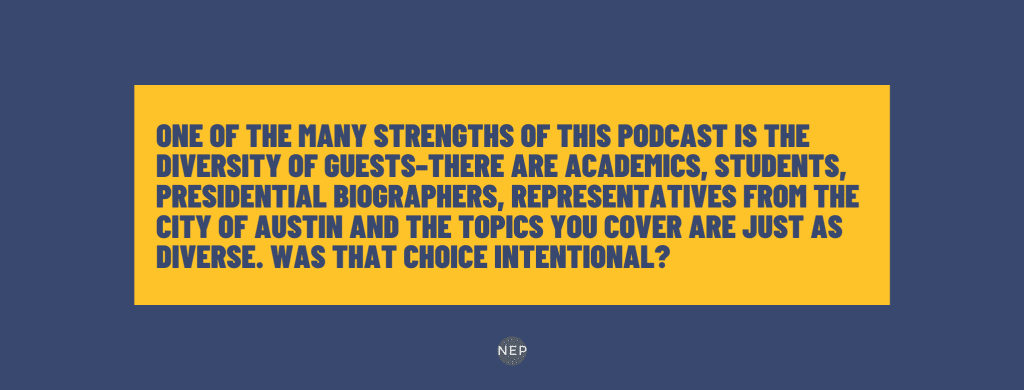
AIS: That’s fantastic. That was one of the first things that drew me to this podcast are those opening poems. They are so captivating, and every single one of them is so rich. And so that brings me to my next question on one of the many strengths of this podcast, which is the diversity of guests. There are academics, students, there was a presidential biographer, there are representatives from the city of Austin. And the topics you cover are just as diverse. I remember, as a TA for one of your classes, we were having a conversation in class with the students and by the end of the week, there were some students on the podcast as guests. And so I wonder, was this choice intentional to include this wide range of guests and topics?
ZS: Yeah, that’s one of the great things about doing this podcast as a partnership is that each of us suggest new guests, and it’s not always easy, but we always come to a table compromise. And I think that’s part of the reason we’ve had such a wide range of guests. And I think that it allows us to look at these issues from many different lenses through a literary lens, a historical lens, an activist lens, a political lens. And I think that that really allows us to see the issues from from a new perspective.
JS: And, and one thing I’ll add, Zachary has been instrumental in forcing me to think beyond the usual suspects. One of the things we fall into, Alina, and I think in all professions, is that we end up with a closed circle, people we know people who we read, we have our subfields, we have our spaces of routine, and having Zachary as an instrumental part of planning each week’s episode, and we do an episode every week, really his input, and then the input from students, the input from graduate students, the input from listeners, I get a lot of emails each week suggesting guests, sometimes people suggesting themselves. But that multiplicity of influence every week reminds me that I shouldn’t just rely on the usual suspects. And that’s a really interesting intellectual opening. For me and Zachary, each week, we have interesting discussions about the topic we want to talk about, and the person we want to have on. And we don’t have an agenda, which is to say, we don’t have an ideological point of view. We don’t have a desire for people to say certain particular things. What we want are people of all walks of life, who are seriously thinking about democracy, about what democracy has been, in all its good and bad elements, what it has become today, and what we want it to become tomorrow. And beyond that we are open and some of our best discussions are with students, as you mentioned, or social activists, as well as policymakers or, or historians.
ZS: Yeah, I just want to say too, that one of the things that that quarantine and COVID-19 has forced us to do, and in many ways enabled us to do is to reach guests across the country and the world in a way we weren’t before when we were in the studio. With the technology that we have to use to record out of the studio, we’re actually able to reach people as far as Berlin this week. And a couple of weeks ago, we did one in Massachusetts and all across the world. And I think that’s actually a real strength of this moment. And I think that really makes our podcast special.
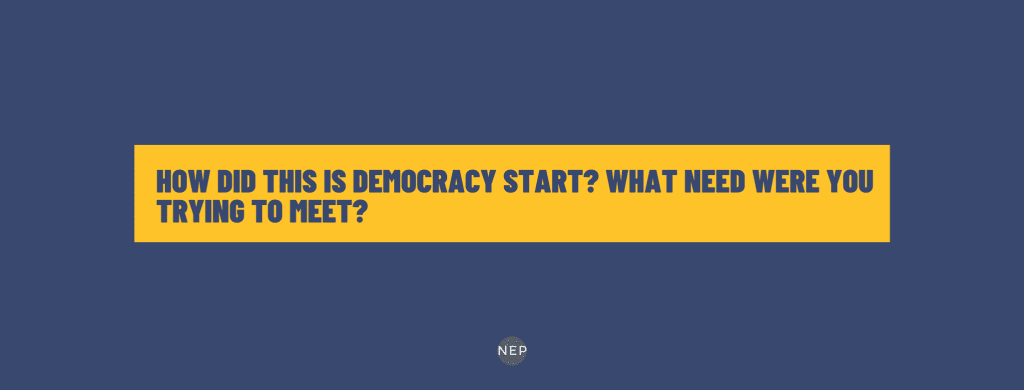
AIS: So to bring it back to the original idea for the podcast. How did it start? And what sort of need were you trying to meet in the podcasting realm?
JS: That’s a great question. So before we started this podcast, Alina, I had only intermittently listened to podcasts here or there. I was not an avid podcast listener before we started. And I remember the moment this podcast began, actually, Zachary and I were sitting at the counter kitchen, which is one of my favorite diners here in Austin. I miss not having been there now in six months. We were sitting there. In the afternoon, it was the late summer of 2017. And I had just published I was just about to publish my most recent book, The Impossible presidency. And Zachary said to me over some greasy cheeseburgers that we were eating, that we go there when mom and Natalie are not with us, so we can have greasy cheeseburgers. He said to me, you know, it’s really great that you’ve written another book. But if you really want people to engage in your work, you need to do a podcast. And we’ve had, we had a long conversation. And he at that time was listening to a really phenomenal podcast series. It’s not an ongoing podcast, but it’s a series that was produced by public radio in Chicago called the making of Obama. It’s just phenomenal because it goes back. It’s really not about Obama’s presidency. It’s about the history of Chicago, and how Chicago shaped Obama in his time as an activist there, and they talked to activists, politicians, civil rights workers, police others. And it just opened my mind listening to that, not simply to the topic, but to the way in which the podcast form, Alina, opens the conversation, how it’s less hierarchical, less authoritative, there still is an inequality between the producer and the listener. But it’s a much more open, artistic, creative space. And the informality allows for an interrogation of issues and the creation of civil conversation in ways that we don’t see enough of in our society, quite frankly, in ways that we often don’t do well enough in the classroom. And so the potential to reach a larger audience to do it in an informal meaningful way, in a way that’s substantive really attracted me to it, and we were working closely or I was working closely With the liberal arts Instructional Technology service at the University of Texas, I think you were actually ta for me at the time in the coming semester. Or maybe you would just ta for me, and my class and I talked to them about it. And they were super enthusiastic. And as always, the technical assistance we get it UT is just phenomenal. And it should be said that our podcasts succeeds in part because of the role that university plays in particularly liberal arts Instructional Technology Services and supporting the podcast and supporting its use in my classes. And that partnership has really been crucial, but we wouldn’t be doing the podcast if it hadn’t been for Zachary’s suggestion about it. Zachary, would you want to say more about that?
ZS: There’s not really much more to say but that, that one of the things we want to do as well is highlight all these scholars and activists around us who had really interesting things to say, but never really had a platform. And so try and keep the podcast, globally informed. But we also try and keep it locally grounded at the same time.
JS: And just to give a couple of examples, because Zachary is absolutely right. And he is he is focused on that every week, you know, we really try to showcase people who are doing interesting things, and newcomers, so we’ve had people like your colleague and fellow graduate student Augusta Dell’ Omo who was recently on CNN, so I guess she’s now made it to another level as well. We’ve had Chris Rose, another graduate student of ours, we’ve had young professors as well as more established professors, we’ve had young activists as well as more established activists. And I do want to say that in comparison, even to TV and radio, where there is a tendency to look for the established names, this podcast platform really allows us to showcase people who are not well known yet but perhaps have more interesting things to say. And many of them are connected to our university. Many of them are not, and that’s fine, too. We can do both.
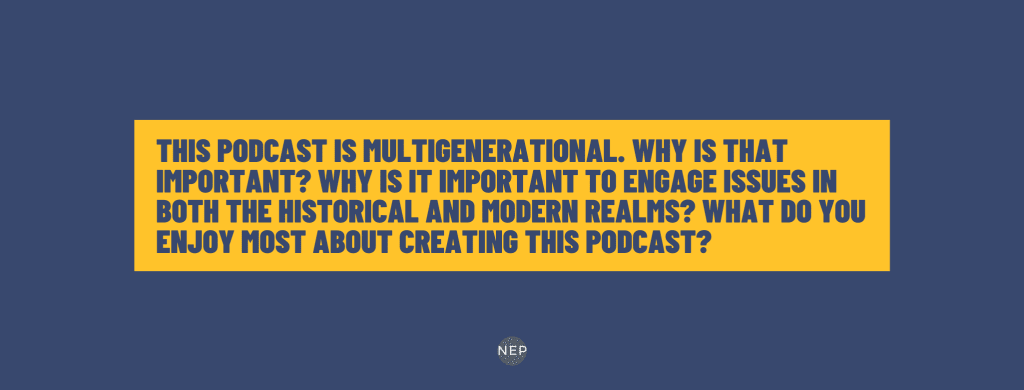
AIS: Something else that really strikes me about this podcast is that it is multi-generational like you are doing it as father and son, but also collaborating together, and also engaging in issues in both the historical and contemporary realms. And so I’m wondering, why was that important, at the beginning of the podcast, to be engaging in issues, from historical to more contemporary topics?
ZS: Well, the entire impetus of the podcast was to try and make history and historical scholarship matter to young people. And so we’ve always tried to keep at its core, our podcast centered around bringing the voices of scholars and historians, to young people. And that’s why it’s so important that we do this in a multi-generational way. And even in our guests try to reach across generations, within fields and try to reach across continents even.
JS: And I’ll just build on that for a second Alina. I mean, you know, one of the one of the really important elements of this is that we approach this as a podcast about the history and future of democracy. But we think about it as historically interested in carrying people, but not people who are just speaking to historians. In fact, we are speaking to historians, but our goal is to bring the history to those who often don’t have a connection to it. And the multi-generational element there is crucial, because one of our operating principles is that there are a lot of young people out there who should be interested in history. But they’re not because it’s not presented to them in the way that connects to their own experiences to their own background. Maybe they’re from diverse backgrounds, and the history is being presented to them in a way that doesn’t speak to that diversity, or it doesn’t speak to their experiences, or it’s presented from a textbook alone, or it’s presented in a politically narrow way. And, and our goal is to reach beyond that. And our faith is that the history itself, the topics carry interest for people, we organize the podcast around the topics that we think will appeal to a wide range of people, particularly younger educated listeners, and the guest in a sense, that’s who the guest is, is secondary to that it’s not about the name of the guest, even though we sometimes have famous people on those aren’t always our best episodes. It’s about the topic and the substance of the history. What draws us as historians you and I and Zachary to these topics, but in a way that will draw people who don’t have the history bug or don’t know they have it yet.
AIS: So on that vein, what do you enjoy most about this podcast?
JS: Gosh, I enjoy everything about it. I’d say, first and foremost, I enjoy doing this with my son. It’s such a wonderful privilege for me to be able to spend time thinking about this each week with Zachary and to learn from Zachary. And to do this with him it is, it’s a joy beyond words, I have to say, I love talking to our guests, many of our guests are people I have talked to before many people I have not talked to before we’ve had people on whose work we read, or who we saw their activism, or somehow we came across them. And the first time we’ve talked to them is in preparation for the podcast. And I love meeting and connecting with people in a format where we get to learn deeply about what they do what they care about. And that is all contributed not only to the enjoyment and the wider sense of citizenship that I’ve developed from this, but it’s also changed my scholarship, Alina, it’s really widened my own lens on thinking about the history of democracy, a topic I’ve written a lot about, and I’m writing a new book about how a topic I lecture about and teach about. It’s really opened my lens to more voices, but also to a wider range of conceptual issues that I hadn’t thought about as deeply before. And I find myself going and doing research and reading more deeply on topics on the actual substantive talk topic, but also the conceptual architecture, in ways I wouldn’t have if I didn’t have these conversations. So at every level, it’s, it’s so much, it’s so much fun.
ZS: Yeah, I would say that what I find most fascinating about doing the podcast is, is sort of learning about something or coming across something in school or outside of school, or with my dad. And, and, and being able to immediately set up a podcast about that and to go into depth about a topic that that seemed interesting at face value. But it’s even more interesting when you start to get into it. And I think that has really broadened my horizons to so many different perspectives, and topics. And every week, I come out of the podcast, thinking about all these different things that really shaped my world that I never realized before. And I think that’s one of the really positive things that our podcast offers to young people.
AIS: Wow. I mean, maybe every historian should do a podcast. This is fantastic.
JS: I think so, you know, it was Carl Becker who writes in every person, is his own historian, I think every historian, her own podcast.
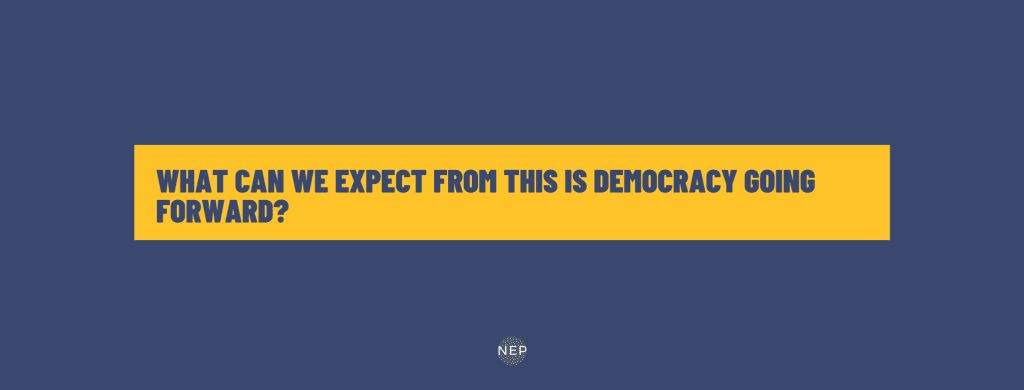
AIS: So we’re coming to the end of the interview. But I have a question about the podcast. What can we expect from This is Democracy going forward? Can you give us any insights into guests that you might have on in the future? What can we expect from the This is Democracy?
JS: That’s a great question. And one of the wonderful things about this podcast is, we’re always thinking about topics that need to be covered more, because there’s interesting work out there, but also because they’re relevant. And we’re not trying to catch up with the headlines. We’re trying to provide the historical background that people need to think about what’s going on in their world and think forward. So I’d say that we have been thinking long and hard in the lead up to this election and preparing as we all are, for the aftermath of this election, which hopefully will come soon. We’ve been thinking about how our podcast can provide people not simply with information, certainly not just with more opinions are going to be hearing lots of opinions. But with a historical framework for understanding what seems such a disorienting, chaotic time, we’re not going to be doing podcast episodes on Democrats or Republicans. But we are going to be talking about how democracy adjusts in periods of difficult transition. How have we adjusted in the past? What can we learn what have other societies done? We also are very committed, I think, to have more voices on from activists, one of the strange things about this moment we’re in is we’re hearing more and more, but the voices we hear tend to be overwhelmingly voices of established political figures arguing with one another. We really want to get a sense and showcase the multiplicity of actors in our societies who are doing creative things that in the long run will probably have more effects or I think of those involved in racial justice, those involved in dealing with economic inequality, and dislocation health activists, those really trying on the grassroots level to rethink how we deliver health care. All of these topics have a long history. And we’re going to be bringing in various thinkers and actors in those settings, to describe how that history influences their work today and hopefully to inspire listeners to use that history as they move forward in 2021, and other periods to rebuild democracy to remake democracy, we’re optimistic that there’s a creative, exciting future for democracy, but it’s going to look very different than it did even a few months ago. And we want to be providing some of the historical inspiration and background. For those who are doing this work going forward.
ZS: I would say that one of the things that I hope to do in the next few months, and I think that we’re really on the path towards, is bringing more of a literary lens into guests as well. I think oftentimes, we have a lot of activists or, people who are very engaged in politics. But I think we also need to recognize that there’s a cultural and linguistic lens to all of these things that we’re talking about. We’ve recently had a literary scholar from Amherst, a philosopher in Berlin, all sorts of really interesting guests, and I, and I hope we can continue that moving forward.
JS: And we have and Alina, you’re certainly one of these individuals, we have so many talented young scholars, and activists, and sometimes they’re one in the same emerging in our department in the Department of History, I think one of the preeminent departments in the country, and other departments at the University of Texas and other schools. And we will be showcasing, I think more and more young scholars because they need a platform, they need an opportunity to share their wisdom and their work. And I think our listeners will want to hear from them. In many ways. I think our listeners want to hear from people who are not showcased elsewhere, they can hear from established names and other venues. They look to us to bring interesting people to them who they haven’t heard from before.
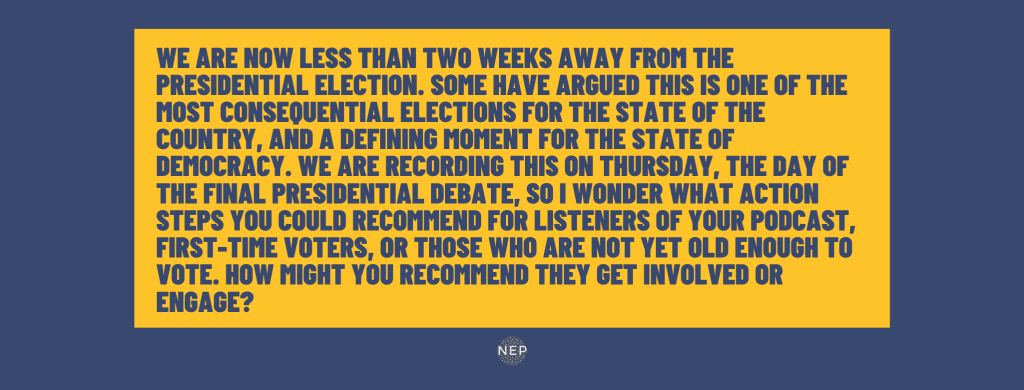
AIS: I completely agree. That is so fantastic. And there’s so much to look forward to. So since we have a couple of minutes left, I do have another question. We are less than two weeks away from the presidential election last night was the final presidential debate of the season.
JS: Thank God
AIS: Yes, it’s over. And we’re recording this on Friday. So it’s all very fresh in our minds. And so I’m wondering what both of you would recommend for your listeners for first time voters for those who are not old enough to vote? How would you recommend they engage in politics in history during the season? And one of the most consequential elections for the state of democracy in recent history?
JS: That’s a fantastic question. I think about this a lot, Alina, because students often ask me questions in this vein, not quite as eloquently as you put it, but they often ask I know that asked you to and I would say two things. But these are not perfect answers because it is a very difficult question. I think first, it’s really important to understand what elections have meant in American society, they’ve obviously meant a lot. But they’ve always been complex, messy, unfair, unjust. And, and that in no way makes us feel better about our moment today and in no way excuses all the dirty laundry of our history and our elections. But I think understanding this should buck one up to get more involved and to see the importance of quite frankly, fighting for what you believe in, and I don’t mean violently fighting for what you believe in, we write about and teach about our elections in high school classes, as if they’re these you know, orderly processes. People go and they fill out a ballot, and then we calculate the results. They’ve never really been that way. They’ve always been hard-fought battles with all kinds of anger, all kinds of efforts of cheating, and they only work. They only work when people are vigilant and involved and willing to fight for what they believe in to stand up for their rights. We talk a lot about civil rights activists in that context, we talk a lot about women’s suffrage, just in that active in that context. This is true for all groups for all immigrant groups, for all groups in our society. So seeing that history and seeing that one is part of a long history of fighting for democracy and again, nonviolently fighting and standing up for your democracy. That’s really important. I think that’s inspiring. I think that’s a sense of duty that we get from reading this history. It contextualizes our moment and then second, I still believe Alina, that we need a model, calling them heroines or heroes is probably not right. But we need models, we need people we can look up to people who remind us that there’s something noble in politics, that there’s a purpose. It’s not just a fight over power between angry old white men. There really is a deeper purpose in our politics. It’s not always evident. At certain moments, we see more purposeful politicians than others. But for us to see that there’s something new Noble and essential in what we’re doing, and to look back and find figures and I hope every citizen and I think every citizen, every person can find people in the past flawed people in the past sinful people in the past, but people in the past, nonetheless, who can be inspiring for many of my students, it might be a civil rights activist, it might be a suffragist. For some, it might be a secretary of state, it might be a military commander. Again, we’re not looking for heroes. We’re not looking for men of marble. But we’re looking for those who remind us of the nobility and purpose in what we’re doing for our podcast, to some extent, is Franklin Roosevelt. We were inspired, both Zachary and me, and many of my students who were forced to listen to my lectures about Franklin Roosevelt, you were one of them, you had to listen as the teaching assistant. I’m inspired by Franklin Roosevelt’s flawed, but still serious and deep commitment to making democracy work for citizens who had been disengaged for so long connecting them. And using the power of our democracy, to give people a chance and opportunity for them that they didn’t have otherwise, it was unequal. He did not think about citizens in equal and fair ways across racial groups across gender. But he did believe that all citizens should be involved in served by government and that inspires us because we want our podcast to engage everyone and to make everyone feel like they have a place and a role and an opportunity. So I think history helps in that sense, there is some idealism some hope we can find in history, if we don’t study history, we can get lost in and sometimes we all feel this way, lost in the mess of our time and lose sight of what’s really important and become disillusioned and cynical. And then the bad guys, when we have to see that there is a possibility in the past, there’s an alternative to what we’re living with now. And we can take the past as inspiration for that. Zachary, what do you think?
ZS: I was just gonna add that I think one of the things that comes through in our podcast is that all of the topics we talked about, no matter how tangentially related to politics, they are, are dependent on the protection of our democracy, and say in politics. So I think if you care about any of these issues that we talked about on our podcast every week, you can’t isolate yourself from politics or from our elections, you have to get involved.
AIS: Well, thank you both so much. And thank you for joining us today. I would encourage all of our listeners to keep an eye out for more crossover content from Not Even Past and This is Democracy. You can subscribe to This is Democracy wherever you get your podcasts. Thank you so much, Professor Suri and Zachary again.
JS: Thank you Alina.
ZS: Thank you.
The views and opinions expressed in this article or video are those of the individual author(s) or presenter(s) and do not necessarily reflect the policy or views of the editors at Not Even Past, the UT Department of History, the University of Texas at Austin, or the UT System Board of Regents. Not Even Past is an online public history magazine rather than a peer-reviewed academic journal. While we make efforts to ensure that factual information in articles was obtained from reliable sources, Not Even Past is not responsible for any errors or omissions.
